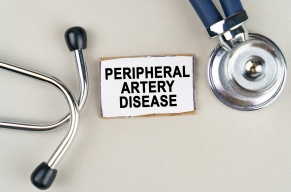How Poor Circulation Affects Your Heart
From an interview with
Dr. Carmen Piccolo
McLeod Vascular Associates Florence
Plaque buildup, blood clots or narrowed blood vessels can lead to poor circulation. When obstacles or narrow paths slow down blood flow, it’s difficult for your circulatory system to send blood to every part of your body in an efficient way. McLeod Vascular Surgeon Dr. Carmen Piccolo explains the symptoms and risk factors that can lead to poor circulation, as well as the ways you can help prevent or improve this condition.
What are the signs of poor circulation?
When we talk about circulation, we’re discussing the arteries that bring the blood from the heart down to the toes and the veins that drain the blood from the toes back to the heart. When we’re talking about poor circulation, that is peripheral arterial disease (PAD), which causes blockages or hardening of the arteries, mostly of the lower extremities.
Patients who have symptoms of poor circulation have cramping pain when walking. Usually, they’re able to walk a certain distance, then they experience pain, generally in their calves, but sometimes in their thighs as well. That completely resolves at rest. Once they start walking again, it reoccurs. It doesn’t happen intermittently; it’s every time you walk a certain distance or if you walk quickly or up a hill. That’s something we call “claudication,” and that’s one of the initial signs of poor circulation, outside of just identifying it in patients based on their risk factors.
Who is at risk for poor circulation?
There’s a large population of people who are at risk for peripheral arterial disease. Unfortunately, the Pee Dee area of South Carolina has one of the highest occurrences of the disease in the United States. The risks are the same as for heart disease. People have to quit smoking, because smoking is the number one risk of developing peripheral arterial disease – for clogging the arteries and issues that lead to limb loss.
Also, in addition to family history and genetics, there is the problem of hypertension. High blood pressure, high cholesterol, diabetes, kidney disease, and poor kidney function all lead to it.
How can we improve our circulation?
It’s simple. Number one, don’t smoke. Number two, if you do have high blood pressure, which a lot of people do, take your medicines and get your blood pressure checked regularly to make sure it’s under control. On top of that, it’s imperative that your cholesterol levels are good – that the bad cholesterol number is low and the good cholesterol number is high. One of the best ways of managing that besides medication is through exercise.
Exercise is very important in peripheral arterial disease. In fact, one of the initial treatments is exercise through a supervised vascular rehab program, which we have here at McLeod Health. It is the only program in the state of South Carolina that truly addresses the condition this way. Also, if you have diabetes, make sure your glucose and sugars are under good control. Controlling all those risk factors is the biggest way to help prevent having the disease in the first place.
Is healthy eating important in improving circulation?
Healthy eating is very important. You should be eating things that are heart healthy, things with low saturated fats, lean proteins, a lot of vegetables – basically, the Mediterranean diet. All those things work in your favor to decrease the risk of developing peripheral arterial disease.
At what point should you see your physician and/or a vascular surgeon?
The number one thing is to be seen early, be diagnosed early, and be treated early. If you have significant risk factors for having peripheral arterial disease – meaning, if you smoked a large amount in your lifetime, you have long-standing high blood pressure or diabetes, or you have family members who have had peripheral arterial disease, you should be screened. The screening is very simple, and it’s painless. It’s something we call an ankle-brachial index, where we put a blood pressure cuff on your ankles and one on your arm, and we check the blood pressure between the two. That helps us to determine if you have significant peripheral arterial disease or not.
To learn more, speak with a vascular surgeon near you.
-
McLEOD REGIONAL MEDICAL CENTER FLORENCE
843-777-2000 -
McLEOD DARLINGTON
843-777-1100 -
McLEOD DILLON
843-774-4111 -
McLEOD LORIS
843-716-7000 -
McLEOD SEACOAST
843-390-8100 -
McLEOD CHERAW
843-537-7881 -
McLEOD CLARENDON
803-433-3000



-
McLEOD REGIONAL MEDICAL CENTER FLORENCE
843-777-2000 -
McLEOD DARLINGTON
843-777-1100 -
McLEOD DILLON
843-774-4111 -
McLEOD LORIS
843-716-7000 -
McLEOD SEACOAST
843-390-8100 -
McLEOD CHERAW
843-537-7881 -
McLEOD CLARENDON
803-433-3000
 Find a Doctor
Find a Doctor  Locations
Locations  Services
Services 